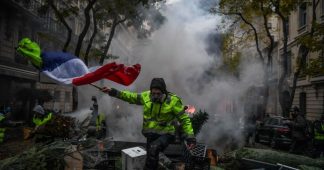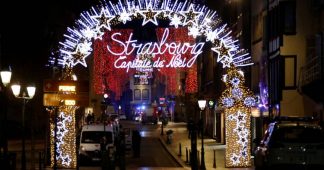By Dimitris Konstantakopoulos
December 14th, 2018
“No Christmas this year” is written on the placard of a protester in Toulouse, the “ville rose” of Southwest France, once a bastion of French socialism.
He must be a sadist this guy. He wants to kill Mr Macron’s – and Baron Rothschild’s, his superior’s – last hope that, if no man can be found to help them get rid of the Yellow Vests, at least Santa Claus will be able to do it.
“What do you want for Christmas?”a mother asks her 20-year-old son. “To win”, comes the answer.
The dialogue is given to us by a slightly stunned LeMonde in the front-page of its December 1st edition, under the title “France in an unprecedented social crisis”.
The moment of revolt
This exchange of words catches a rare moment. It is when Ego, the “Me”, escapes, for a while, the very limits of its miserable existence, submitting itself to, diluting itself into and being identified with the, temporarily at least, infinite and all-powerful “We”.
It’s the moment when the individual becomes aware that the collective interest is more important than the individual one, that individuals cannot live or be saved by themselves. They need other human beings, they need Society and Civilization.
If that happens and if all other means like parties, elections, trade unions etc. have been exhausted, then a revolt becomes possible.
As we have pointed out in a previous article, when examining the current developments in France, it becomes evident that the situation approaches, if not already reached, thestate, which the revolutionary literature describes as “pre-revolutionary “, when those on the top can no longer rule and people form the “down”can no longer tolerate their rule. This is in fact a diagnosis, not a prediction about what it may happen next, because from this point onwards many different outcomes become possible.
Surely we are not in a position to predict, especially writing from far away from the events, whether on Saturday this wave of revolt will retract or hold. Though, even if the first happens, something that we don’t consider likely, any retreat will be temporary. Neither willthe crisis be solved, northeabyss, now separating Power from the People, will be bridged soon.
The crucial test for what may follow is the size of Saturday’s mobilisations, which the Power has tried to stop with Macron’s concessions on Monday on the one hand and with the “Islamic terrorism” on the other. The crisis issues have now disappeared from the French media, now covering exclusively the alleged Islamic terror attack, with more and more French people in the social media expressing serious doubts if it was really a terrorist attack and not a desperate provocation of the “deep state” to save the President and his government.
Any reference to the Yellow Vests since the Strasburg events is only made in the context of appeals to retreat and cancel the demonstrationsof Saturday, given the “war on terror”, in which all must join forces. Former French Prime Minister AlainJuppéwent as far, as to treat those insisting on demonstrating as “enemies of democracy”.
The Liberal Right, who initially supported the yellow vests, is now withdrawing, as indeed is Mrs Marine Le Pen. By doing this, Mrs. Le Pen seems to confirm claims of some observers, including her own father,who consider her “anti-systemic”posture and credentials rather fake, intended to fool once again the deeply dissatisfied citizens of France, only this time from the right end of the spectrum.
Of course, Le Pen’s withdrawal was preceded by the defeat of her agenda, which was promoted by her followers inside the revolt movement. Let us note at this point, that Le Pen or somebody else from her camp, could, at some point in the future, serve in extremis as a last-resort solution (de dernier recours) for the French bourgeoisie,should its regime be seriously threatened. In such a scenario she will present herself as the ‘law and order’ candidate, sprinkled with a flavour of patriotism, without any anti-capitalist substance, as a solution to a deadlock after a period of prolonged instability.
But any such scenario is still far away. Now it’s still the time of the triumphant People, a People gradually acquiring a collective consciousness of their power that they no longer want to lose. They know that if they leave the streets and the barricades, they will end up again at the mercy of the forces that provoked their uprising in the first place.
After all, the withdrawal of the Liberals and Le Pen seems to betray the panic of the “Power behind Power,” which does not concern itself now with the long-term political future of its various political instruments, but rather with how to stop the revolt at any cost.
Workers and the Cities
Another crucial factor for the future of the movement is whether the working class will join in, as it happened when, after few weeks of student demonstrations, the workers joined in driving the 1968 Revolution to its peak. Groups within trade unions are now trying to trigger a general strike. Students and pupils take to the streets, accompanied by their parents, forming a shield against a police, which went so far as to treating a group of school kids as prisoners of war. So far, however, the vast majority of the working class and the urban populations of the country express support for the Yellow Vests, but have not yet joined the mobilizations in large numbers.
The vital question of leadership
A movement as deep and significant as the one currently being developed in France will soon face the question of forming a political leadership, which is something ofcritical importance for the final outcomeand can make the difference between success and disaster. We know how important this is from the history of all revolts. We also know it from the Greek tragic experience, when SYRIZA took the leadership of the Greek anti-memorandum movement, just to betray it and destroy it.
Besides, any potential success of the movement in France will have to face, sooner or later, the hostility of the entire European establishment, as was the case also with the French Revolution of 1789.
The violent scenario
The scenario of resorting to a widespread use of violence cannot be ruled out, as indeed reveal the photos of snipers on the roof of the Élysée Palace on December 1st (they reminded us of the snipers who begun British intervention in Greece and the Greek Civil War, by firing at the peaceful crowd from the rooftop of the Hotel Grande Bretagne in Athens Constitution Square, at December 1944), police’s intention to use drones against protesters before being stopped by the Paris Prefecture and, of course, the image of school kids treated as war prisoners by French police.
For the time being though, authorities are trying to hold things back in more peaceful ways and by making concessions. And they can never be certain about how police will react, if it will obey their orders (in the case of the massive, quasi-insurrectional, anti-memorandum demonstration of May 2010 in Athens, it was not at all certain that the police would have stopped protesters from marching into the parliament building; however, their attitude changed, along with the numbness overtaking the protesters themselves, after the deadly arson attack to Marfin bank in the Greek capital).
More 1789 than 1968
So far, the French revolt seems to present more similarities and follow paths analogous to the Great French Revolution of 1789 rather than to May 1968, although closer in time; and there is a fundamental reason for this, which we will try to explain below.
The French Revolution of 1789 is, in some way, the founding historical milestone of modern Europe. The France of Voltaire and Descartes, of Danton and of Robespierre played, for the modern world, a comparatively similar role to that of the Athenian Democracy for the ancient world.
On the walls of every French public building there is a sign that reads “Liberté, égalité, fraternité”. It’s the slogan of the French Revolution and the motto of the French Republic. Nobody pays usually any attention to it; nobody wastes time reading these signs, in the same way that we don’t usually waste our time reflecting on clichés.As for the leader of the Revolution, the “Incorruptible”Maximilien Robespierre, very few references are made to him in France. It’s like the country wants to bury any memory of him, if not of the Revolution itself, as deeply as possible.
Nobody pays attention to all that except one; a person stays in silence, quiet but omnipotent, whenever he decides to become so. A personwho remembers everything, including the famous motto and its full meaning, who remembers everything that was in the school books, the books we threw away as soon as the year ends.
This person is nobody else than theSubconscious of every person, the collective subconscious of the Nation, that is of the People, the two notions being identical in the context we examine.
All those precious memories, the memories of the facts and of their meaning and importance, are still kept there. They remain in the center of the popular social and national culture of France, in its DNA. Despite two centuries of relentless efforts to erase this memory and to alter the very meaning of French history, the identity of the Frenchpeople still carries on it the world-wide message of the 1789 Revolution: Freedom, Equality,Fraternity.
The message was repeated by the five Revolutions the French made since 1789, often shedding their blood for them (1830, 1848, 1871, 1936, 1968). Its core values were transmitted generation after generation, from the parents to their children and grand-children, shaping the identity of a nation that has historically been constituted as “revolutionary”. Revisionist Historians like Francois Furet proclaimed that Revolutions, and probably Utopias themselves, are harmful, if not criminal movements away from the order. The Nouveaux Philosophes came then and the Neoliberals, who believe Humans and their Societies do not and should not havehistory. Theyfoughtthe values of the Revolution, they chased them in the public sphere of the country, only, as it seems, to make them stronger in the very depths of the people’ souls, where they could find shelter.
People don’t look at or think on their identity documents as they go about their daily lives. They turn to their identities when it becomes absolutely necessary.
A Nation, a People will only pull such memories out of the closet when they feel that they are in the greatest of dangers. Only when it feels the need to rely on the achievements of their ancestors in order to oppose the future prepared for them by the Power and to make reality the future it itself needs.
This works also the other way around – when you see a people doing it,that means things are getting really serious.
Back to the future
And there we are now, in this revolt, which was initiated by the poorest and more despised strata of the French society, the common people of the lower classes, as withthe sans-culottestwo centuries ago, winning along the way the support of the workers and lower middle-classes. It is the memory of 1789 which seems to instinctively guide the protestors.
They abandoned the usual locations of their demonstrations – the Republic and Bastille Squares – and tookto the large boulevards designed by Haussmann so that the artillery could be used against the people, heading to the symbolic centre of the French Power, the Champs-Elysées and, for the moment, on December1st, they manage to take it over for a while.
They do that because they are now convinced that protests are not any more effective, that they cannot achieve anything with them, because they feel the only way forward is to get the power itself back from those who have usurpatedit.
Against the police, in Paris and all over France, they wave the flag of the Republic andsing its national anthem, which is no other than the song of the Revolution, La Marseillaise: To arms, citizens!
And as we will show it’s not only the flag and the anthem of the Republic that come to the forefront. Slowly, hesitantly other ghosts of that era such as Louis XVI and Robespierre start becoming faintly visible.
From the red to the three-coloured flags
In contrast to the past there are no red flags in this revolt. And this of course makes sense given that the poorest classes, who started it, remain divided as far as it concerns their political preferences, even if the relative majority of the yellow vests (41.2%) declaredthemselves Leftistsin a huge survey conducted by 70 scientists for Le Monde about the movement.In the presidential election, the lower classes appeared also divided into three parts, those who did not vote at all, those who voted for Le Pen and those who voted for Mélenchon. The yellow vests want to succeed, so they take awayanything that can dividethem, reducing at the same time their appeal on society.
Besides, it has become very difficult to understand what the term “Left” means, after decades of an impeccable implementation of neoliberal policies by French Socialists, after the collapse of the USSR, after the Ovidian transformation of Tsipras’ “radical left”, with European social democracy in a state of clinical death, after so may disappointments and betrayals. Without them, it would simply been impossible even to imagine the rise of the radical Extreme Right in the continent which experienced the Brown Plague.
But present and active is also another process, yet more profound, a kind of “fatigue of history”. For now, the analyses of the world we live inhave made great progress, but what has made less progress is the quest for an alternative paradigm, the definition of a convincing vision for the future.And if Chavez called it “socialism of the 21stcentury,” Mélenchon now speaks of a New Humanism that must govern the relationships between people, but also of a new, harmonious relationship with Nature.
Back in 1968, the French, building on the achievements of the victory over Nazism and in the context of post-war social-democratic welfare state they had created after the war, in the context still of the ‘trenteglorieuses’, the thirty glorious years of rapid economic growth, wanted to go even further, towards more Freedom, towards a new social and cultural Utopia, towards Self-management (Autogestion). Even De Gaulle, althoughdefeated this Revolution, he was so impressed by some of its ideas he tried subsequently to reform, from the top,French capitalism. The French bourgeoisie got so scared of his plans, it conspired to overthrow him and terminate his political career.
But what is at stake now is nothing of this kind. French people are not claiming now a new, higher form of social organization and civilisation, regardless of what may come out of all this in the end. Now, the French people are revolting because they don’t want anyone to take away from them the core of their“bourgeois”political regime and of their civilization, built throughout themore than two hundred years since the Revolution. The meaning of their revolt is not to build a new social order, but to defend what was already achieved in the past from the frontal attack of Financial Totalitarianism. The French bourgeoisie has long surrender itself to the globalised Finance and now, as in the days of Vichy, it has been left only to the people to defend the political system based on some form of popular sovereignty and, as claimed by some people, the only way to do this is by overthrowing the Fifth Republic and establishing a Sixth!
Of course, by entering this way, sooner or later you will claim much more.
In the 1980s, the demolition of the welfare state by the Neo-Liberals began. In the 1990s the USSR collapsed taking with it, along with its negative elements, the very real and important achievements of the regime created by the 1917 Revolution. Following next was the violent demolition of the (far from perfect, but relatively progressive) regimes created by Arab national liberation, anti-colonial movements and even of the Arab countries along with the regimes. Then, in 2010, Neoliberalism, transformed by then into more and more open financial Totalitarianism, attacked the very core of the system, starting first by destroying, and by making an example of it, a country of the periphery of the center, Greece.
This is what French people feel. They feel that they got stuck with their backs to the wall. They understand, as Italians probably also do,that in the end, the future that lies ahead for them may be that of Greece. In the once prosperous France, ten million people live on less, or on substantially less, than 900 euros per month.
They sing the Marseillaise, wave their three-coloured flag and go the Arc of theirTriumphs (it was a Prussian General, Von Clausewitz, the most influential theoretician of War, who realized better than anybody else, how much the ideas of the Revolution had contributed to the astonishing victories of the French armies). They do it because the battle they have to give now is about popular sovereignty and the very future of their Nation. They remember the Great Revolution because they need to defend now what this Revolution did achieve.
This is the deepest reason a usually rather conservative country like France has turned now, suddenly, into the field of a very unusual, for modern European standards, revolutionary “experiment”.
Rothschild demission!
Macron, Rothschild’s ex-banker, who is now appearing on protestors placards as Louis XVI, has helped the French more than anyone else to understand what is really at stake here. By deciding, the Lords of Money, to put one of their employees, and indeed their banker, in the position of the President of France, they contributed more than anyone else could have done, to the outburst of the revolutionary movement.
In order to bring Macron to power, they had to destroy what was left from the French traditional parties, the Socialist Party and the Right. The filled up the parliament with Macron’s clones, that is, human robots, resembling a President who has never managed to fully acquire human characteristics, who is trapped in Lord knows what form of distorted childhood traumas; a person, who most likely was raised to become President, as they used to do in the past with Princes – after all, his nickname was “The Little Prince”.
By destroying through various conspiracies the main political parties, the Socialists and the Gaullists, by refusing to make any concessions to the trade unions and, by doing so, rendering them useless and by taking away from Mayors any real power, they themselves have obliterated all systemic buffers of the status quo.
They took control of the media to the point of disgust, rendering them mere mechanisms of propaganda; and what have they achieved in the end? To make people not believing or paying attention to anything said by the media.
Macron stood immaculate at his enthronement ceremony. His only flaw was that his couldn’t sing the Marseillaise, as everyone else around him. Because he feels a foe to them, he cannot identify with the People, with the Nation that his bosses sent him to govern. The anti-human figure of this President has identified with, and unwillingly revealed, totally naked, for everybody to see,the real totalitarian content of the social program of the Empire of Finance, whose religion is nothing else than Death. People felt what lies ahead for them. In fact, by concentrating all power in its hands, without keeping any pretence and by putting Macron to his throne, the Empire did not accomplish but one thing: they offered to the French people the perfect enemy.
There is no other person across Europe now, who is hated more than the French President Emmanuel Macron. And if there is something that best expresses the current state of mind of the French people is the slogan “Macron demission”.
Yet the worst is probably still to come, because Hybris leads to Nemesis. “Rothschild demission” was what we saw yesterday written on an improvised placard.
Along comes Robespierre!
When the ghost of King Louis XVI appears, one has to expect that the ghost of his opponent will also be looming over somewhere near; and this is no other than the ghost of the country-born lawyer, Maximilien Robespierre from Arras, who led the French Revolution and was known to his contemporaries as “the Incorruptible”.
Jean-Luc Mélenchon, the leader of France Insoumise, was very fast in grasping this. While delivering a speech to his supports in Bordeaux, on December 8th, probably the best of his career, he addressed to the pro-Macron deputies in the Parliament the exact words Robespierre had addressed to the Constituante, more than two centuries ago:
“Legislators, do not forget you are not the representatives of a privileged cast, but representatives of the French people. Do not forget the source of your power is justice and the most trusted guarantor of public peace is the happiness of the citizens. The prolonged convulsions ripping apart states are nothing more than the result of the struggle of prejudices against principles, of selfishness against general interest, of the powerful against the rights and the needs of the weak”
The speaker defended the legitimacy of the Yellow Vests’ revolt reminding to his audience that it was in fact the Constitution of the First French Republic which declared that the most sacred of all rights and the most useful of all obligations and duties, is the right and obligation of the people, or of a part of the people, to revolt when the government violates law and justice.
And with the authoritybestowed upon him by the very same act of defending the legitimacy of the revolt, being obviously aware of the violence which may at any point in time be unleashed by the state, as it has been done in the past over and over again, from the Commune to the war in Algeria, and being aware too of the violence that societal anger can unleash, he goes on strongly inciting citizens to preserve the peaceful character of their revolution.
A Trotskyist as a youth, along with at least half the staff of the French left, he is arguably the most educated among contemporary French politicians. He knows that protesters are reserved towards him as they are towards all other parties and politicians. He can sense that the wall of mistrust between the people and those who aspire to represent them, including him and the movement he leads, has not yet fallen. He invites the members of his own movement, the France Insoumise, not to try to appropriate the movement but to let the movement appropriate them.
Greeks constructed their word for truth as “aletheia”, which comes from privative prefix a- “not” + “lethe” for forgetfulness, oblivion. One must remember what is important and essential (and only that, because if he remembers everything he will become like the Bourbons who “learned nothing and forgot nothing”).
That is why French people need now their past achievements to impose their popular Truth on the Truth of the Kingdom of Money. This is a Revolution.
When intellectuals become ‘sellouts’, Voltaire moves out.
Everything started form something trivial. It was an increase in the price of fuel, which however, burdeneddisproportionally the poorest residents of the suburban and rural areas. It forced them to think that they have to do something at least, that they must stop letting the government eating away at their lives. At first it was the poor, but they soon found solidarity by workers and lower middle-classes, by those who are frightened by the fate of the poorest seeing in them their own future.
Let us also note that the revolt takes place in a country, which has already gone through the “Cartesian” experience of the 2005 referendum, during which politics, in the form of public debates even about the most complicated problems of the international arena, usually supposed to be reserved only for high trained specialists reached to every little coffee-shop across the country; forming a situation which, mutatis mutandis, reminded in many ways, at least in the quality of arguments and analyses employed and the high levels of participation, the Ancient Agora of Athens, organized through the Internet this time!
In 2005, a group of around 10 intellectuals who were gathered together in the course of one day, by the state counsellor Yves Salesse, once more an old Trotskyite, decided to confront all political parties, all media and all Europe, campaigning in favour of “No” to the “European Constitutional Treaty”. Their ideas and arguments managed to influence the French and got them on their side. 55% of the people voted No.
But there weren’t any political subjects, capable or willing to continue the fight, nor the intellectual force to transit from the No to the indispensable Yes, to some form of positive program for a different France, a different Europe. Finally, and in spite of the social explosions of 2005 and 2006 which followed this referendum, Sarkozy came to power, turning No into Yes,by adopting through the Parliament the Lisbon provisions, which the voters had rejected previously.
The French did not forget the mockery. In fact, they are now capitalising on the intellectual achievements of the all-encompassing popular-national debate of 2005. Besides by now, not only the French but also the whole word has realised the atrocity of the programmes that its rulers want to implement on them.
The moral and intellectual power of the Plebeians
The foundation of any significant intellectual creation lies in the moral stance that one adopts towards the world. Intelligence or education play a role here of course, but it is secondary, not the determinant one. It was through its moral stance that the Russian intelligentsia of the 19th and the beginning of the 20th century was able to make its huge contribution to world history and civilization. The same holds true for French intellectuals and their central role in shaping European and world culture throughout many centuries and up to 1980. This was also the foundation of the contribution of the ancient philosophers, from Heraclitus to Aristotle, from Democritus to Protagoras, the teacher and mentor of Pericles. It needs much courage to discover and tell the Truth.
When this courage cannot be found in the upper and the middle classes, and their accompanying intellectuals, then individual and social intelligence, critical thinking often persecuted in the universities, the media and the official institutions themselves, is not lost, but it often finds very peculiar ways to invest those who badly need it. This was the case with the Gilets Jaunes, who obviously used all the accumulated intellectual capital and experience of previous defeated movements and revolts, to find their way in developing their movement. And when the simple people decide to act, then they are usually a hundred times more determinant, more courageous and more practical than intellectuals themselves.
The way in which the Yellow Vests solve any problems arising in the course of their mobilisations as well as the array of arguments and ideas employed in their problem-solving, is really impressive. This was also one reason from the moment the movement started to grow it wasn’t possible to stop its course or make it deviate. They were able to put aside anything that could potentially function divisively, such as the immigration debate; so that they could focus on the social issuesand raise more and more political questions even touching upon the form of regime.
The Liberal Right tried to present the movement as an anti-taxation campaign, which, by opposing taxes it also opposed the funding of the welfare state. This was obviously not what the protesters wanted and they quickly brought forward an agenda of social demands, putting before anything else the increase of the minimum statutory wage (SMIC), a demand that has already been satisfied.
France’s intellectual capacity and the level of consciousness of the French people has allowed the Yellow Vests to quickly bash Macron’s “environmental” arguments in a process of addressing any possible contradictions between the “ecological” and the “social”, which resulted in the Parisian flirt of the Yellow Vests and protesters against the climate change.
Ironically, the Yellow Vests adopted Macron’s pre-election motto “No Left nor Right”. In fact, the motto was imposed by the need to serve the best interest of the movement itself, as the poorest classes were themselves divided over their stance to the parties. But also because, having experienced decades of deception by political parties and trade unions alike, they now trust no one; to the extent that they refuse any form of centralised coordinating structure, even if something of this sort is maybe required objectively now, by the size of the movement.
With every day that passed the discussions at the roadblocks became more sophisticated, touching more and more upon issues of general interest, the demands became deeper. People in the streets discovered again the warmth of a socialisation which had long ago been lost in the deserts of the French suburbs and villages, where, sometimes, one cannot find even a decent café. Gradually, the French citizens of black and North African origin, representing the manual working-class of France, started appearing too at the roadblocks. New leaders emerge there every day, like the mushrooms after the rain
France and Europe
If Macron is the most hated person in France now, the European Commission is the most hated institution.
But the French have founded Europe, they are not against Europe, they are against the specific Maastricht Europe. For the time being they did not find a way to combine those two positions. The Revolt does not feel it should claim a Frexit, which is heard as a slogan, but only in the margins of the movement.
By the way the problems put, or to be put in the future by the French revolt, arenot probably questions which can be solved just by restoring national sovereignty in the environment of a globalized Europe and of the international domination of the Financial Capital. There is much more here, including geopolitics. Those aspects will appear sooner or later.
For the time being, French are busy to deal with their own power, which constitutes the first obstacle to the revolt movement the very course of their and world history has obliged them to mount.
The Greek Crisis of 2010-15, was the final rehearsal of the War between Societies and Finance (it was not an accident that it affected also a historic European nation), the way the Spanish Civil War of 1936-39 was the final rehearsal before WWII.
Now, Greece has been defeated and the war is moving to the center of the Continent.











